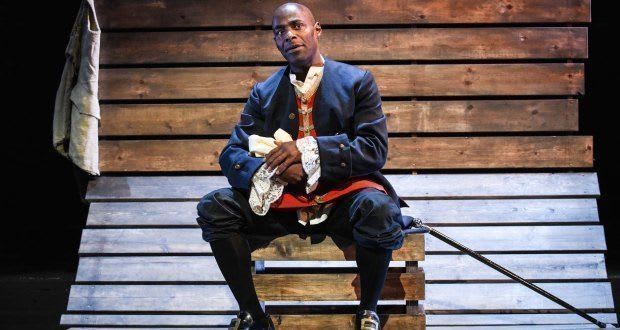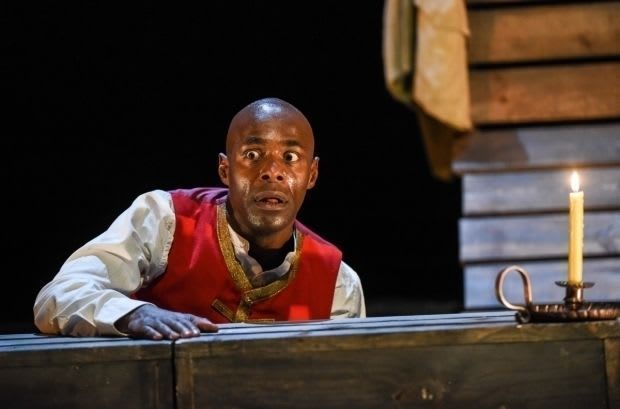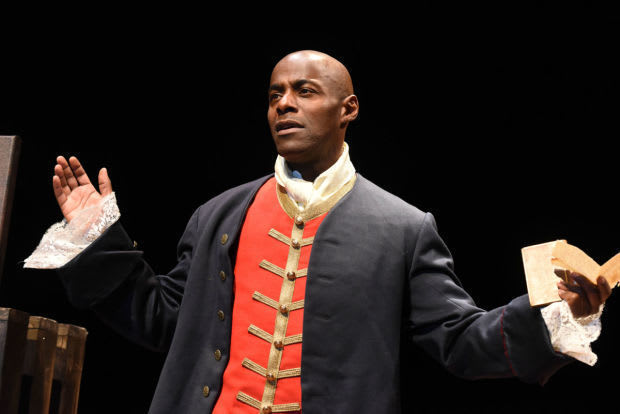Paterson Joseph begins his performance of Sancho as himself, explaining why he wrote it. How, seeing his peers playing costume drama, he was eager to join them but there weren’t black roles for, of course, Britain didn’t have a black population before the Windrush generation.
But that’s not true; there were African legionnaires among the Romans on Hadrian’s Wall, Elizabeth I even complained about the number of blacks in London. It was a portrait, a painting by Thomas Gainsborough, that caught his attention and led to this play—and Joseph then becomes its subject.
Now, as music plays that was written by the sitter, Joseph becomes Charles Ignatius Sancho posing for the painter when in Bath in 1768. He is just as engaging as the actor but with a voice that is much more refined, upper class crystal rather than RP and almost flirtatiously amusing. At this point, he is valet to George, Duke of Montague and Earl of Cardigan, but he tells us his whole life story from his birth, as he imagines it, on a slave ship on the third passage then when his New World owner takes him to Europe as a little boy given as a present to three maiden aunts who rear him and name him Sancho after dressing him up as Sancho Panza in a domestic theatrical.
Panza is paunch in Spanish and the sisters thought the plump lad fitted the character. Indeed, he admits to a weakness for cook’s syllabub and his girth saw the older man gout-plagued, but Joseph lacks a suitable rotundity. It is the only thing missing from his bravura performance.
The ladies consider reading, writing and music would “undermine simplicity of character” and say that for his own good they “will save you from ignorance while preserving your innocence.” But he is fascinating by words and wants education and runs away and on Blackheath encounters the Duke who secretly sets up his schooling, though continuing as the ladies’ servant.
Sancho cleverly characterises each person he encounters—at David Garrick’s suggestion, no less, he takes to the stage in Oroonoko (with a rich African accent). He marries an attractive Jamaican girl (with matching voice), becomes the next Duke's valet until he is too fat and gouty to carry out his duties and then is set up as a grocer, meanwhile making friends in cultural circles, exchanging literary letters, composing music, getting published and playing a part in the campaign to abolish the slave trade.
This is a life that refutes the idea that black people were recent arrivals in Britain. It is just one of many but Sancho has singular distinction. He was the first Afro-Briton to vote in a British general election, though, like some of the Windrush generation, he had a problem producing the documents needed to claim his rights. His vote for freedom was only the beginning of a long struggle that isn’t yet over, but this is a play that opens eyes to a more accurate history.
With Simon Godwin as co-director, Paterson Joseph holds the audience in his hand for seventy minutes of magical theatre. He invites one lady on stage to give her a dancing lesson, directly address individuals in the audience creating a lively impression of spontaneity with a performance that is very carefully crafted though using the simplest means.
Sancho: An Act of Remembrance has played in New York and some other US cities but in the UK only in Oxford and Birmingham before reaching Wilton’s. It should be seen much more widely but catch it in Grace Alley while you can.


